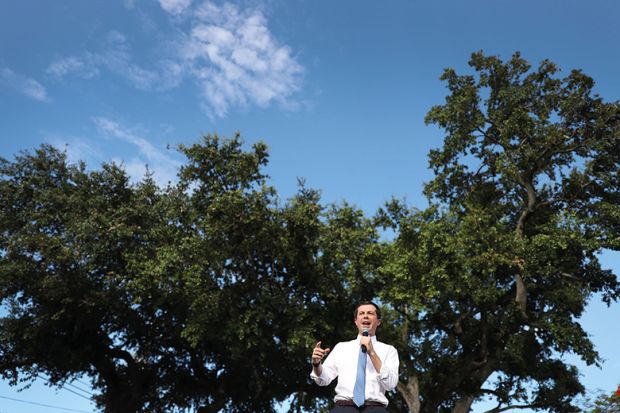Minority college students and minority-serving institutions in the US are having a much-needed moment of attention as Democratic presidential candidates compete to show their support. They are less clear about what it might mean in reality.
In the latest high-profile example, one of the most prominent candidates, Pete Buttigieg, issued a detailed 18-page proposal that includes making public college tuition free to low-income students and boosting funding for minority-serving institutions by $25 billion (£20 billion).
It is part of a plan that Mr Buttigieg named after renowned 19th-century abolitionist Frederick Douglass, meant “to remedy centuries of dehumanization and discrimination” against black Americans by making reforms in education, legal protections, healthcare, job opportunities, home ownership and voting rights.
Other leading Democratic contenders – including Kamala Harris, Elizabeth Warren and Joe Biden – have offered similar positions. Even Mr Buttigieg’s eye-popping suggestion of $25 billion to help bolster minority-serving colleges – which currently receive about $500 million a year in federal support – is dwarfed by Ms Warren’s call for $50 billion.
The competition to help the nation’s 101 historically black colleges and universities, or HBCUs, comes as many of them struggle to survive. They already rely more heavily on government support than other institutions, making them highly susceptible to changes in policy and economic conditions, a report by the American Council on Education warned earlier this year.
And the leaders of such institutions know not to get overly excited by plans such as that offered by Mr Buttigieg, said Ivory A. Toldson, a professor of counselling psychology at Howard University, one of the nation’s most prominent historically black institutions.
That is because achieving such lofty funding goals will depend primarily on Congress and the president’s true determination, once in office, to insist on them, said Dr Toldson, the editor-in-chief of the Journal of Negro Education.
In the case of Mr Buttigieg, Dr Toldson said, the Douglass Plan appears to be “political expediency”, given the record of the South Bend, Indiana, mayor. Much of the scepticism towards Mr Buttigieg centres on complaints of chronic mistreatment of black citizens by the police of South Bend, a white-majority city that wraps around the University of Notre Dame.
But even the leading black presidential candidate, Ms Harris, may be guilty of political misdirection, Dr Toldson said. Ms Harris gained in popular support after attacking Mr Biden for his opposition to the use of long-distance bussing to forcibly integrate US public schools.
Bussing, however, is not an indisputable solution to the educational challenges facing minority students in the US, said Dr Toldson, who was bused as a child in Louisiana and recalled white residents moving out of their neighbourhoods as soon as black students arrived. “They couldn’t fix the bussing routes fast enough to keep up with the outmigration of white people at the school,” he said.
For both voters and higher education leaders concerned about the fate of black students, Dr Toldson said, it is a reminder that intentions do not always translate into successes.
In the case of voters, he said, the plans offered by Mr Buttigieg and other candidates are largely a reminder of the critical importance of the black electorate in the Democratic primary races.
And in the case of institutions, Dr Toldson said, the political reality can be found in scenes such as the Thurgood Marshall College Fund, a major supporter of historically black institutions, partnering with right-wing billionaire Charles Koch.
Such an odd alliance shows that historically black institutions need the help and tend to be located in America’s south, where their local member of Congress and governor is most likely to be a Republican, Dr Toldson said.
“It shouldn’t surprise anyone that HBCUs would be willing to negotiate with someone in the Republican Party,” he said. “HBCUs would have a very difficult time surviving if they were to just adhere to one type of party affiliation.”
Register to continue
Why register?
- Registration is free and only takes a moment
- Once registered, you can read 3 articles a month
- Sign up for our newsletter
Subscribe
Or subscribe for unlimited access to:
- Unlimited access to news, views, insights & reviews
- Digital editions
- Digital access to THE’s university and college rankings analysis
Already registered or a current subscriber? Login







